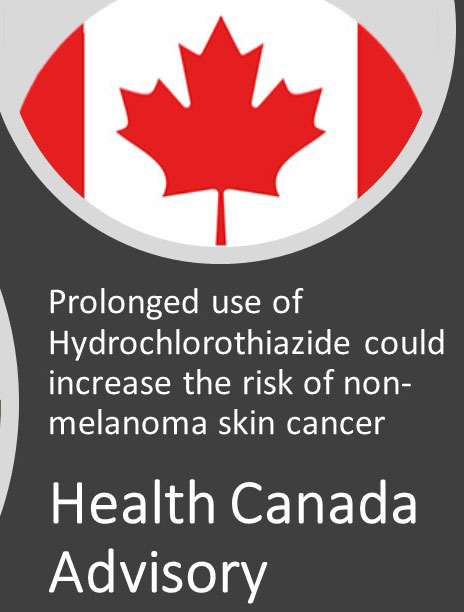Health Canada (January 31, 2019) – Health Canada has completed a safety review of hydrochlorothiazide and has found that prolonged use of the drug could increase a person’s risk for non-melanoma skin cancer.
Hydrochlorothiazide is a prescription drug used to treat high blood pressure and swelling. It is known to make skin more sensitive to ultraviolet radiation and sunlight, meaning patients can get sunburned more easily.
Health Canada reviewed the best available evidence on the issue. Findings suggest an increased risk of non-melanoma skin cancer for patients who have used hydrochlorothiazide for more than three years. However, it is important to note that the studies reviewed had significant limitations. For example, there was a lack of patient data on sun exposure and severity, and duration of high blood pressure. Such data could help clarify the cause of the increased risk.
In light of these findings, Health Canada has concluded that prolonged use of hydrochlorothiazide may be associated with a risk of non-melanoma skin cancer that is at least four times the risk of not using hydrochlorothiazide.
Because of the seriousness of this risk and the wide use of this drug, Health Canada is taking a precautionary approach and is working with manufacturers to update the Canadian product safety information to reflect this new risk.
Important safety information for patients:
- Talk to your healthcare provider or pharmacist if you are using hydrochlorothiazide and have any concerns regarding your risk for non-melanoma skin cancer.
- Inform your healthcare provider if you identify any new skin lesions, such as moles or changes to existing skin lesions.
- Limit your exposure to sunlight and avoid using tanning equipment as it can increase the risk of non-melanoma skin cancer. Use adequate protection when exposed to sunlight (e.g., sunscreen with SPF 30 or higher, clothing, and a hat).
- Talk to your healthcare provider if you think that you may be at a particularly higher risk for non-melanoma skin cancer (e.g., if you have light-coloured skin, if you have a personal or family history of skin cancer, or if you are receiving ongoing immunosuppressive therapy).
Important information for healthcare providers:
- Research findings suggest an increased risk of non-melanoma skin cancer with prolonged use of hydrochlorothiazide. However, because of important limitations in the studies, substantial uncertainty remains regarding these findings.
- Patients taking hydrochlorothiazide should be informed of the risk of non-melanoma skin cancer. They should be advised to regularly check their skin for new lesions or changes to existing ones, and to report any suspicious skin lesions to their healthcare provider.
- Patients taking hydrochlorothiazide should be advised to limit exposure to sunlight, avoid using tanning equipment, and use adequate protection (e.g., sunscreen with SPF 30 or higher, clothing, and hat) when exposed to sunlight to minimize the risk of non-melanoma skin cancer.
- Alternatives to hydrochlorothiazide may be considered for patients who are at particularly higher risk for non-melanoma skin cancer (e.g., patients who have light-coloured skin, who have a personal or family history of skin cancer, or who are receiving ongoing immunosuppressive therapy).
Source: https://healthycanadians.gc.ca/recall-alert-rappel-avis/hc-sc/2019/68976a-eng.php

